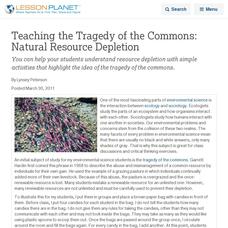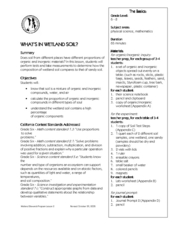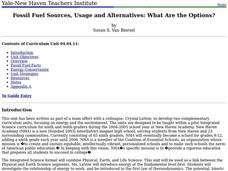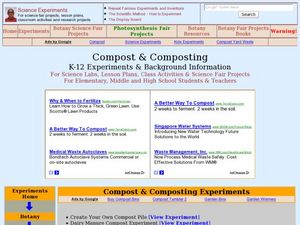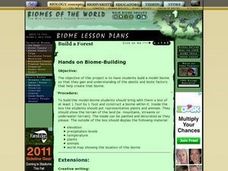Curated OER
Global Meltdown
In this environmental science lesson, students study data and animation on global temperature increase to complete 8 short answer questions that follow.
Curated OER
Chesapeake Scramble
In this environmental science activity, students identify the different animals that live and visit Chesapeake Bay by completing 6 word scrambles.
Curated OER
Invasive Mussels
In this ecology worksheet, students study a fact sheet on invasive mussels. They answer 8 short answer questions about it after reading the provided information.
Curated OER
Teaching the Tragedy of the Commons: Natural Resource Depletion
You can help your students understand resource depletion with simple activities that highlight the idea of the tragedy of the commons.
Curated OER
What's in Wetland Soil?
Students examine the organic and inorganic components of soil. In this environmental science lesson, students identify the factors that influence soil formation. They collect soil samples, conduct tests, and analyze the results.
Curated OER
Watershed Landscape
Students demonstrate how water flows by building a human watershed using themselves. In this ecology lesson, students compare and contrast point-source and non-point source pollution. They write what they have learned from this activity...
Curated OER
Global Warming and Hurricanes: Is an Increase in the Number of Stronger Hurricanes an Indicator of Global Warming
Ninth graders investigate whether stronger hurricanes are signs of global warming. In this environmental science instructional activity, 9th graders research both sides of the issue about global warming. They debate for or against this...
Curated OER
Fossil Fuel Sources, Usage and Alternatives: What are the Options?
Students identify the different sources of fossil fuels. In this environmental science instructional activity, students research about how these impact our environment. They explore renewable energy sources that could replace fossil fuels.
Curated OER
Water, Water Everywhere and Not a Drop to Drink
Students identify the different stages in the water cycle. In this environmental science lesson plan, students research about different water pollutants in watershed. They describe ways to purify water.
Curated OER
Water: Our Most Important Beverage
Third graders create a KWL chart about water. In this environmental science lesson, 3rd graders demonstrate how much water on Earth is usable. They act out the different stages of the water cycle.
Curated OER
Connecticut Wildlife: Biodiversity and Conservation Status of Our Vertebrate Populations
Students explore the different types of vertebrates found in their area. For this environmental science lesson, students perform a case study on the Common Raven. They analyze data collected from research and create charts and graphs.
Curated OER
Cycles of Life in an Urban Habitat: Changes in Biodiversity
Second graders compare and contrast animate and inanimate objects. In this environmental science activity, 2nd graders create simple food webs. They observe their environment and create a collage about it.
Curated OER
Energy Generating a Culture: Early American Coal Miners and Coal Mining Culture
Students calculate how much coal they use based on their electric power usage. In this environmental science lesson, students trace the history of coal mining in US. They write a letter to USPS to encourage them to create coal mining...
Curated OER
Greenhouse Gases: The Chemistry Behind the Culprits
Ninth graders investigate the effect of different gases in the atmosphere. In this chemistry lesson, 9th graders explain how these gases contribute to global warming. They suggest possible solutions to this growing problem.
Curated OER
Compost and Composting Experiments
Learners investigate the composting process through a variety of experiments. In this ecology lesson plan, students discuss the benefits of composting. They examine how compost affect plant growth.
Curated OER
Surviving the Conditions
Young scholars explore Earth science by participating in an environmental care activity. In this natural resources instructional activity, students discuss ways to protect themselves from the environment if they are ever in need of...
Curated OER
Mulch
Students conduct a series of experiments on mulching. In this earth science lesson, students discuss the benefits of mulching on soil. They explore how different types of mulch affect plant growth.
Curated OER
Hands on Biome-Building: Build a Forest
Students explore Earth science by identifying environmental factors. For this biome lesson, students discuss the importance of a functioning ecology and design a biome diorama. Students utilize images of trees and plants which represent...
Curated OER
Hands on Biome-Building
Learners explore Earth science by participating in an environment activity. In this biome lesson, students discuss the importance of a healthy ecology in order to sustain life, both animal and plant. Learners utilize a cardboard or wood...
Curated OER
Take the Lead — Get the Lead Out
Students research about the physiological effects of prolonged lead exposure. In this chemistry lesson, students investigate the lead content of different paint, soil and water samples. They analyze data trends and share their findings...
Curated OER
Environmental Awareness — Think Global, Act Local
Students identify the different hazardous wastes and the dangers they post to the environment. In this physical science lesson, students brainstorm ways to dispose them properly. They create a short story, song or poem to conclude the...
Curated OER
Trash Inventions
Second graders develop a plan to recycle trash. In this environmental science instructional activity, 2nd graders sketch their invention and construct it. They present the final product in class.
Curated OER
Environmental Limitations
Seventh graders study the environmental factors that affect population growth. In this biology instructional activity, 7th graders create a city following certain criteria. They present their posters in class.
Curated OER
Particulate Matter
Seventh graders examine the different types of pollutants. In this environmental science lesson, 7th graders observe particulate matter under a microscope. They explain how these can affect once health when breathed in large quantities...





